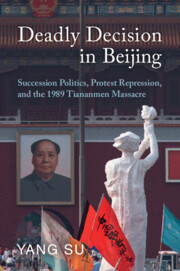
-
Select format
-
- Publisher:
- Cambridge University Press
- Publication date:
- February 2023
- March 2023
- ISBN:
- 9781009122061
- 9781009100762
- 9781009114202
- Dimensions:
- (229 x 152 mm)
- Weight & Pages:
- 0.66kg, 338 Pages
- Dimensions:
- (229 x 152 mm)
- Weight & Pages:
- 0.5kg, 338 Pages
You may already have access via personal or institutional login
Book description
Three decades after 1989, historical materials are now available for understanding the Tiananmen protests in a new light. In a play-by-play account of the elite politics that led to the military crackdown, Yang Su addresses the repression of the protest in the context of political leadership succession. He challenges conventional views that see the military intervention as a necessary measure against a revolutionary mobilization. Beneath the political drama, Deadly Decision in Beijing explores the authoritarian regime's perpetual crisis of leadership transition and its impact on popular movements.
Reviews
‘A stunning, meticulously researched, brilliant analysis. Yang Su’s book forces us to re-evaluate everything we thought we knew about the Tiananmen Square movement and its violent repression. The analysis also reminds us of how much we miss when we lack access to information about elite decision making processes and how those processes may shape trajectories of social movements. While activists think strategically about how elite opponents’ vulnerabilities open up opportunities for action, their elite opponents may be thinking strategically about how they can use movements to position themselves in elite power struggles. Elegantly written and perfectly suited for undergraduate or graduate courses related to social movements, revolution, politics, and power.’
Rory McVeigh - Notre Dame University
'a lively narrative'
Andrew J. Nathan Source: Foreign Affairs
‘[A] terrific book - one that is likely to be read, discussed, and cited for some time to come.’
George Lawson Source: American Journal of Sociology
‘This book will be of interest to scholars of China and, more generally, to those curious about authoritarian rule in the modern era. … Recommended.’
Q. E. Wang Source: Choice
‘For a long time, there has been a division between area studies and disciplinary knowledge in the China field. Su’s work demonstrates that this division is unnecessary and unproductive. Like his first book, “Deadly Decision in Beijing” represents a new wave of theory-informed China studies. It not only tells a nuanced story of a crucial episode in modern Chinese history but also contributes fresh insights to social science theories: elite politics, social movements, and historical sociology. Su’s scholarship sets a standard for all sociologists studying China.’
Yang Zhang Source: Pacific Affairs
Contents
Metrics
Altmetric attention score
Full text views
Full text views help Loading metrics...
Loading metrics...
* Views captured on Cambridge Core between #date#. This data will be updated every 24 hours.
Usage data cannot currently be displayed.
Accessibility standard: Unknown
Why this information is here
This section outlines the accessibility features of this content - including support for screen readers, full keyboard navigation and high-contrast display options. This may not be relevant for you.
Accessibility Information
Accessibility compliance for the PDF of this book is currently unknown and may be updated in the future.


